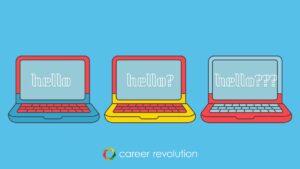As the workforce gets younger and younger their employee beliefs change, and the opportunity for faulty communication and frustration gets bigger and bigger.
Millennials are the dominant generation in the workforce. And, Generation Z isn’t far behind. When surveyed, both these generations reflect on how their organizations do or do not make them feel valued. Likewise, when we at Career Revolution talk to managers and leaders, we hear that this emerging generation wants too much too soon. They want a promotion. They want a raise. They want their ideas heard. They want to work the way they want when they want. They want their employee beliefs to be acknowledged.
The complaints from managers and leaders and from younger employees come from the same place—a mismatch in beliefs.
WHAT WE BELIEVE V. WHAT THEY BELIEVE
How an organization or an emerging professional expresses an employee belief is an extension of a mindset.
For example, employees may believe they should get promoted within their first year of employment. But, the organization may believe that they expect a promotion without earning it.
At the core of these conflicting beliefs is a lack of alignment on mindset. If employees can develop a mindset that progression is more important than pay and promotion, then they can have beliefs and behaviors that reflect that mindset.
CHANGING BEHAVIORS TO CHANGE MINDSETS
Based on our experience working with emerging professionals and organizations, we identified seven mindsets that are key to meaningful development. This proprietary model articulates the beliefs and related behaviors in every organization. They include:
- Promotion
- Communication
- Influence
- Collaboration
- Recognition
- Productivity
- Accountability
EMERGING PROFESSIONAL BELIEFS TO CHALLENGE
Sometimes an organization has a set of beliefs different from their emerging professionals. Finding alignment is not about an organization adapting to the Millennial mindset. Instead, it’s about diagnosing the gap between this emerging generation’s beliefs and the organization’s. For example:
THEY BELIEVE: “WHY DO WE HAVE TO MEET WHEN WE CAN EMAIL OR IM?”
This statement goes to the core of our Collaboration and Communication mindsets. Millennial and Gen Z employees rely heavily on electronic communication. This behavior often contradicts an organizational belief that face-to-face communication is best. To adjust their behaviors, younger employees must believe that technology should enhance communication rather than control it.
THEY BELIEVE: “WORK CAN HAPPEN ANYWHERE AND ANYTIME, WHY DO I NEED TO BE IN AN OFFICE?”
We often see misalignment about work flexibility when it comes to the Productivity mindset. Younger employees are always connected to their mobile devices. So, they expect flexibility to manage their own time. After all, if they’re expected to work 14 hours a day, why can’t it be from their home? But, the organization may believe that work happens best at work. To address this gap, emerging professionals must challenge their beliefs regarding balance and workplace norms and expectations.
THEY BELIEVE: “MY MANAGER IS RESPONSIBLE FOR PROGRESSING MY CAREER.”
When younger employees beg for a career coach or mentor without taking responsibility for their development, there is often an issue on the Accountability mindset. Today’s emerging workforce is more vocal about expecting an organization to show them a clear career path. Managers struggle with not having the answers or training to address this demand. To fix this behavior, Millennial and Gen Z employees must believe their career is an important asset that they must own and develop.
By helping emerging professionals identify their employee beliefs and how they differ from the organization’s, we can start to empower them. When emerging professionals heighten their self-awareness, situational awareness, and organizational awareness, they can behave in a way that connects with your organization’s beliefs.








